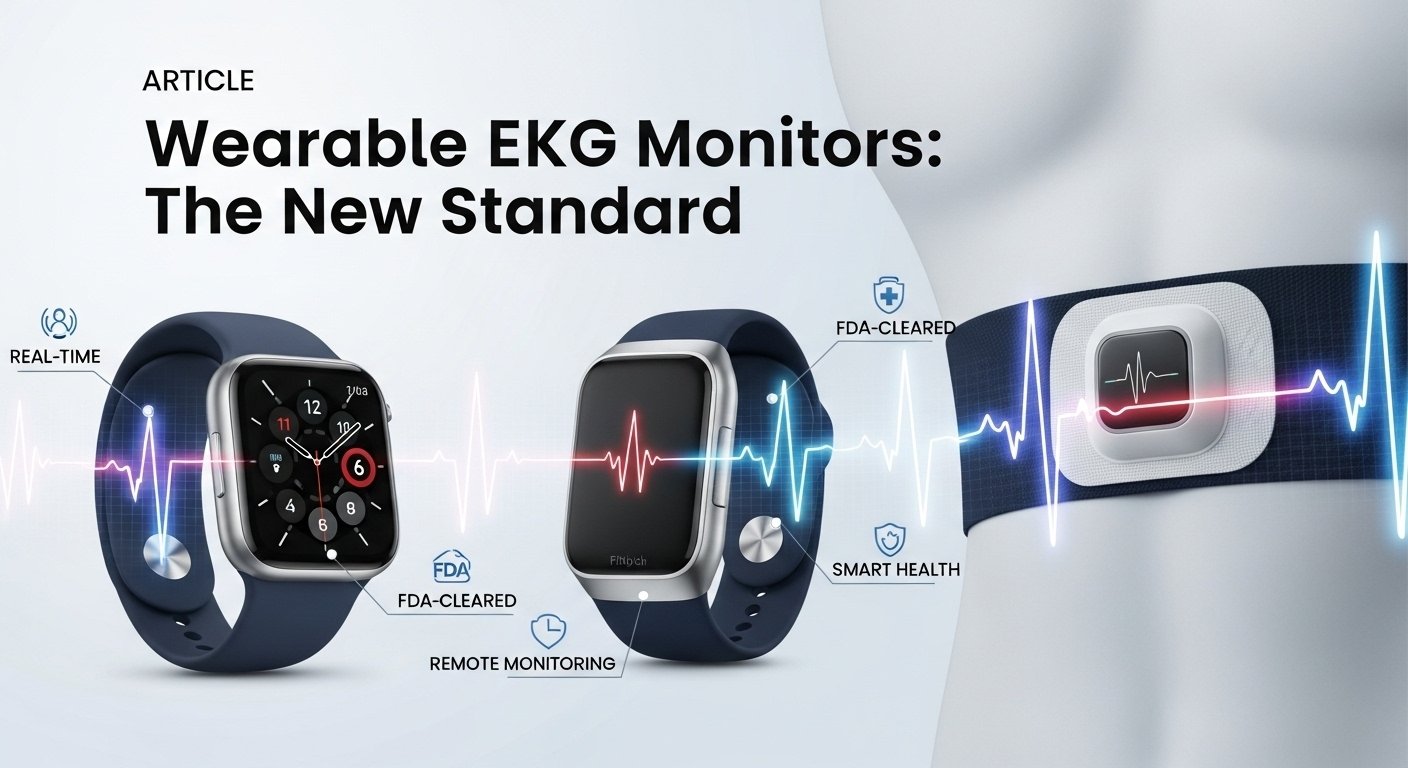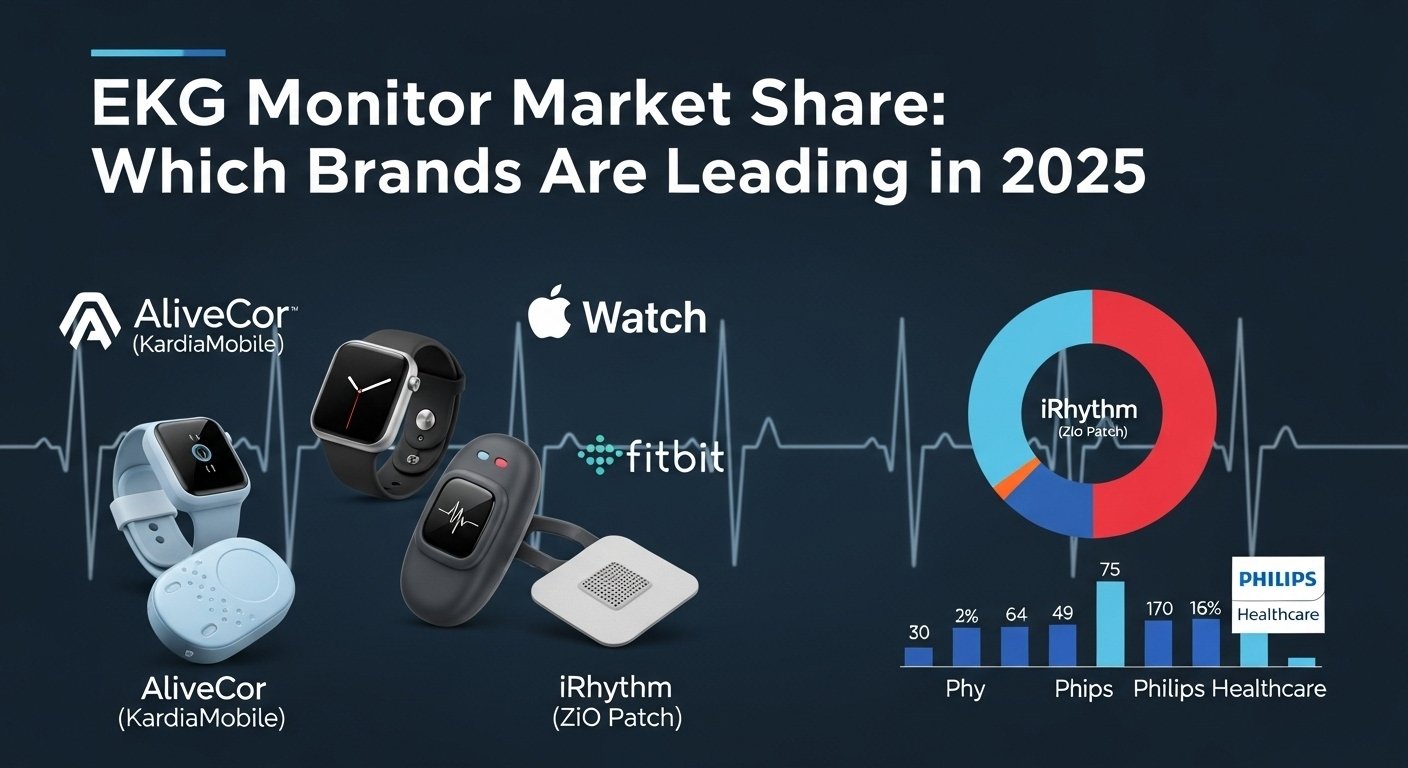The EKG Monitor Market in 2025 is booming and for good reason. Heart disease remains the leading cause of death globally, and more people are realizing the importance of tracking their heart health before problems escalate. This surge in awareness, combined with technological innovation, has opened the door for brands to compete fiercely for dominance.
Leading brands like AliveCor, Omron, Withings, and Apple are continuously refining their portable EKG solutions to cater to hospitals, clinics, and everyday consumers alike. For instance, AliveCor’s KardiaMobile has become a household name for its pocket-sized, FDA-cleared design that lets users record a medical-grade EKG in 30 seconds.
On the clinical side, companies like GE Healthcare and Philips Healthcare still lead the professional segment, supplying hospitals and cardiology centers with high-end diagnostic EKG systems.
This dual demand, medical-grade for hospitals and easy-to-use portable models for consumers, is exactly what’s driving the cardiac monitor market forward.
What Is Fueling Growth in the EKG Monitor Market?
So, what’s behind the surge? Several factors are expanding the EKG Device Market:
- Aging Population: As people live longer, the risk of cardiac issues rises, fueling the need for regular heart monitoring.
- Remote Health Monitoring: The pandemic accelerated telehealth adoption, and remote EKG monitoring is now standard in many care plans.
- Tech-Savvy Consumers: Wearables and smartphone-connected devices from brands like Apple (Apple Watch Series 9) and Samsung are normalizing daily heart tracking.
- Affordability: Devices like the Omron HeartGuide make accurate monitoring more accessible for the average household.
With these factors combined, the global EKG Machine Market is projected to exceed $10 billion by 2030.
For brands, this means staying ahead with technology and ensuring customers feel confident using these devices at home.
Top Brands Dominating the EKG Monitor Market in 2025
While dozens of brands compete, a handful lead the pack:
- AliveCor: Their KardiaMobile 6L remains one of the only FDA-cleared six-lead personal EKGs. It’s trusted by cardiologists and consumers alike.
- Apple: The Apple Watch has brought EKG monitoring to millions who never thought they’d track their heart at all. With each new version, its accuracy and user experience improve.
- Omron: Known for its heart monitors at home, Omron’s HeartGuide smartwatches combine BP and EKG tracking, an all-in-one win for consumers managing hypertension and arrhythmias.
- Withings: Their ScanWatch combines EKG, SpO2, and activity tracking in a stylish wearable, making it popular in Europe and North America.
- Qardio: The QardioCore is a chest strap EKG monitor that provides continuous medical-grade data, a go-to for patients with chronic conditions.
- GE Healthcare, Philips, and Schiller AG: These medical giants continue to lead the hospital-grade EKG system space, supplying clinics and cardiologists with advanced diagnostic machines.
These brands hold over 60% of the global EKG Monitor Market, thanks to their proven accuracy, user-friendly apps, and healthcare partnerships.
Customer Preferences: What Buyers Want in 2025
Consumers want a portable ekg heart monitor, they want peace of mind, convenience, and actionable insights.
Key must-haves in the ECG Monitor Market include:
✅ FDA Clearance: Trust is critical. Devices like KardiaMobile and the Apple Watch are approved for consumer use, an important reassurance.
✅ Smartphone Integration: Buyers expect seamless Bluetooth syncing to health apps like Apple Health, Google Fit, or brand-specific apps.
✅ Real-Time Alerts: Advanced models, like the Withings ScanWatch, alert wearers instantly if an irregular heartbeat is detected.
✅ Cloud Sharing: Doctors can access data instantly, supporting remote diagnosis, a key selling point for brands like Qardio.
✅ Comfortable Design: Nobody wants a bulky device strapped to their chest. Wearables must be discreet and comfortable for daily life.
Brands winning the ECG Monitor Market deliver on these priorities and back them up with responsive customer support.
Wearable EKG Monitors: The New Standard
Wearables are revolutionizing the EKG Monitor Market in 2025. In the past, EKGs required a trip to the hospital or a clunky Holter monitor device. Today, you can wear an EKG on your wrist or chest 24/7.
Apple led the charge, turning smartwatches into medical tools. Now, brands like Samsung, Fitbit, and Withings have joined the race, blending style and science.
Take the Samsung Galaxy Watch: with FDA-cleared EKG functionality, it offers a single-lead EKG on your wrist, complemented by blood oxygen and sleep tracking.
Wearables also attract fitness enthusiasts who want to monitor heart stress during exercise — not just patients with arrhythmia risk.
For brands, this trend means investing in:
- Longer battery life
- Waterproofing for swimming
- More comfortable straps and sensors
- Real-time data transfer to healthcare providers
This user-first design is helping wearables grab a massive share of the ECG Monitor Market and the trend shows no signs of slowing.

Best Ekg Monitor for Home Use: Who Buys What?
The EKG Monitor Market is split into two core segments: professional medical systems and personal ekg monitors.
Hospitals and Clinics:
Brands like GE Healthcare, Philips, and Schiller AG focus on high-end, multi-channel EKG systems for hospitals. These devices capture 12 to 15 leads of heart data, offering precise diagnostics for complex heart issues.
Home Users:
For personal use, devices like KardiaMobile, Omron HeartGuide, and Apple Watch dominate. These single- or six-lead devices are ideal for daily monitoring, helping people catch signs of AFib or other arrhythmias early.
This dual demand keeps the EKG Machine Market dynamic and drives brands to innovate for both professional accuracy and user-friendly design.
The Role of Affordability in Market Share
Affordability remains a game-changer. A decade ago, you needed thousands of dollars for reliable heart monitoring. Now, FDA-cleared devices like the KardiaMobile start at $79, while the Withings ScanWatch sells for under $300.
This accessibility widens the EKG Monitor Market dramatically. More people can afford to proactively manage heart health without costly clinic visits.
Affordable pricing also boosts adoption in developing markets, where cardiovascular disease rates are rising fast but medical infrastructure is limited.
Brands that balance high-end features with affordable pricing like Omron and Withings, continue to expand their global footprint.
How Technology and AI Drive Brand Leadership
Innovation keeps the leaders in the ECG Monitor Market ahead.
Artificial intelligence now powers:
- Arrhythmia Detection: Devices like Apple Watch and KardiaMobile automatically flag abnormal heart rhythms.
- Predictive Alerts: Some models notify users of potential issues before they become urgent.
- Cloud Analysis: Brands like Qardio use AI to analyze massive datasets, improving accuracy over time.
Additionally, real-time doctor integration means your cardiologist can review your EKG remotely, a huge leap from the old days of bulky Holter monitors.
The brands that lead the EKG Device Market aren’t just selling devices, they’re selling peace of mind powered by cutting-edge tech.

Why Trust Is Everything
No one wants to gamble with their heart. That’s why trust and regulatory compliance are non-negotiable in the EKG Monitor Market.
Brands build trust by:
✅ Securing FDA and CE clearances.
✅ Publishing clinical trials that back up accuracy claims.
✅ Offering robust data privacy policies.
✅ Providing clear setup guides, free app updates, and responsive customer support.
AliveCor and Apple win repeat customers because they deliver on these promises. Customers know their readings are accurate, their data is secure, and help is only a call away.
How Reviews Influence the EKG Device Market
Many consumers are curious about the “heart monitor price” before choosing a device that aligns with their lifestyle and monitoring needs. Leading brands in the EKG Machine Market now offer flexible payment options, trade-in programs, and extended warranties, making advanced monitoring accessible while supporting long-term heart health goals.
Top brands showcase verified customer stories, doctor endorsements, and clinical study results. For example, AliveCor often highlights cardiologists explaining how they use Kardia data to adjust patient treatment.
This transparency builds confidence, driving more users to choose trusted brands over cheap knockoffs.
Regional Trends: What’s Selling Where
Different regions shape the EKG Monitor Market uniquely:
- North America: Dominated by Apple, AliveCor, and Omron, high trust in FDA-cleared devices.
- Europe: Withings and Qardio are strong players, blending design and medical reliability.
- Asia-Pacific: Demand for affordable, multifunction wearables is surging. Brands like Xiaomi are entering the space with budget-friendly smartwatches featuring basic EKG functions.
Smart brands customize their offerings by region, respecting local regulations, languages, and healthcare systems.
Preventive Health Awareness: A Key Growth Driver
More people want to take charge of their health before problems arise. This proactive mindset has created a huge opportunity for the EKG Monitor Market.
Brands that position their products as part of a daily wellness routine not just a medical device — win big. Apple markets its Watch as a fitness and health companion, not just an EKG tool.
Educational content helps too. Brands like AliveCor offer free resources that teach users how to read results, when to see a doctor, and how to share data.
Biggest Challenges and How Brands Overcome Them
Challenges in the ECG Monitor Market include:
- Meeting strict FDA, CE, and local regulatory standards
- Protecting sensitive health data
- Ensuring accuracy across different skin tones and body types
Brands address these challenges by investing in R&D, hiring top medical advisors, and listening closely to customer feedback.
What’s Next for the EKG Monitor Market?
By 2030, the EKG Monitor Market will look very different:
- Next-gen wearables will have continuous multi-lead monitoring.
- AI diagnostics will become even more predictive.
- Personalized health coaching will help users make sense of their data.
Leading brands like Apple, AliveCor, Withings, and Omron are already laying the groundwork for this future, keeping them at the top of the market share race.
Frequently Asked Questions
Q1: Which is the best home EKG?
AliveCor KardiaMobile and the Apple Watch are top-rated for daily, reliable EKGs.
Q2: Are cheap EKG devices safe?
Only use FDA-cleared or CE-marked devices from reputable brands. Knockoffs may be inaccurate.
Q3: What’s the difference between a Holter monitor and a wearable EKG?
A Holter monitor records continuously for 24–48 hours for clinical diagnosis. A wearable EKG, like the Apple Watch, does on-demand checks for daily tracking.
Q4: Do I still need doctor visits if I have a home EKG monitor?
Yes! These devices help you catch warning signs but never replace professional care.
The EKG Monitor Market in 2025 is competitive, innovative, and full of promise. AliveCor, Apple, Omron, Withings, and Qardio are driving advancements that make heart health monitoring accessible, reliable, and affordable.
If you’re ready to take charge of your heart health, choose a trusted brand. Invest in the best, because your heart deserves nothing less.


